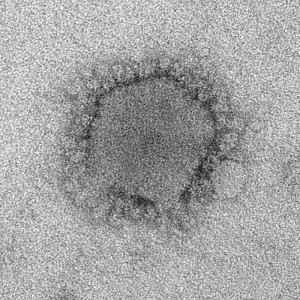Contacts of two US MERS cases test negative for the virus: CDC
The Centers for Disease Control and Prevention (CDC) has now confirmed that neither of the two imported cases of Middle East Respiratory Syndrome (MERS) in the United States spread the virus to any of their household members or to the health care workers who treated the two individuals.

Middle East Respiratory Syndrome Coronavirus (MERS-CoV)
Image/CDC
In May 2014, CDC confirmed two imported cases of MERS in the United States – one in Indiana, the other in Florida. The cases were unlinked, though both infections were in health care providers who lived and worked in Saudi Arabia, where they are believed to have been infected.
As part of the public health investigation into the imported cases, CDC collected specimens from each of the household members and the health care workers with whom the two U.S. cases had close contact. CDC then tested the specimens by rRT-PCR and by serology testing. All household members and the health care workers who cared for the cases tested negative for both active and previous infection with Middle East Respiratory Syndrome Coronavirus (MERS-CoV).
“The negative results among the contacts that CDC considered at highest risk for MERS-CoV infection are reassuring.” said David Swerdlow, M.D., who is leading CDC’s MERS-CoV response. “Today, the risk of MERS-CoV infection in the United States remains low, but it is important that we remain vigilant and quickly identify and respond to any additional importations.” In addition to testing the household and heath care contacts, CDC, state and local public health partners, and foreign ministries of health have contacted almost all of the people who traveled on the airplanes or bus with the patients. At this time, none of the travel contacts who were tested have had evidence of being infected with MERS-CoV. Investigations, including voluntary serology testing of travel contacts, are ongoing, and the situation could change.
CDC routinely advises that people help protect themselves from respiratory illnesses by taking everyday preventive actions like washing their hands often, avoiding touching their face with unwashed hands, avoiding close contact with people who appear sick, and cleaning frequently touched surfaces.















[…] Could Spread With Annual Pilgrimage: OfficialsNBCNews.comNature World News -Reuters -The Global Dispatchall 89 news […]
[…] MERS patients in US did not spread infection to close contactsChicago TribuneThe Global Dispatchall 89 news […]